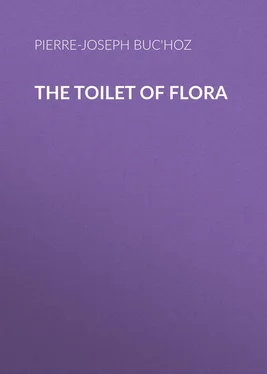Pierre-Joseph Buc'hoz - The Toilet of Flora
Здесь есть возможность читать онлайн «Pierre-Joseph Buc'hoz - The Toilet of Flora» — ознакомительный отрывок электронной книги совершенно бесплатно, а после прочтения отрывка купить полную версию. В некоторых случаях можно слушать аудио, скачать через торрент в формате fb2 и присутствует краткое содержание. Издательство: Иностранный паблик, Жанр: foreign_antique, foreign_prose, на английском языке. Описание произведения, (предисловие) а так же отзывы посетителей доступны на портале библиотеки ЛибКат.
- Название:The Toilet of Flora
- Автор:
- Издательство:Иностранный паблик
- Жанр:
- Год:неизвестен
- ISBN:нет данных
- Рейтинг книги:4 / 5. Голосов: 1
-
Избранное:Добавить в избранное
- Отзывы:
-
Ваша оценка:
- 80
- 1
- 2
- 3
- 4
- 5
The Toilet of Flora: краткое содержание, описание и аннотация
Предлагаем к чтению аннотацию, описание, краткое содержание или предисловие (зависит от того, что написал сам автор книги «The Toilet of Flora»). Если вы не нашли необходимую информацию о книге — напишите в комментариях, мы постараемся отыскать её.
The Toilet of Flora — читать онлайн ознакомительный отрывок
Ниже представлен текст книги, разбитый по страницам. Система сохранения места последней прочитанной страницы, позволяет с удобством читать онлайн бесплатно книгу «The Toilet of Flora», без необходимости каждый раз заново искать на чём Вы остановились. Поставьте закладку, и сможете в любой момент перейти на страницу, на которой закончили чтение.
Интервал:
Закладка:
56. Or,
Infuse in ten or twenty pints of Juice of Damask Roses, expressed in the manner above described, a proportionable quantity of Damask Rose Leaves gathered with the usual precautions. After standing in infusion twenty-four hours, pour the whole into a short-necked alembic, distil in a sand heat, and draw off as much as possible, taking care not to leave the residuum quite dry, for fear the distilled water should have an empyreumatic or still-burnt flavour. After emptying the alembic, pour the distilled water a second time into it, and add a good quantity of fresh picked Damask Roses. Lute it well, placing it again in a sand heat, and repeat the distillation. But content yourself this time with a little more than half the water you put back into the alembic. To impress on Rose-water the utmost degree of fragrancy of which it is susceptible, it is necessary to expose it to the genial warmth of the sun.
Rose-water is an excellent lotion for the eyes, if used every morning, and makes a part in all collyriums prescribed for inflammations of these parts; it is also proper in many other complaints.
57. To make Orange-Flower Water
Having gathered (two hours before sun-rise, in fine weather) a quantity of Orange-Flowers, pluck them leaf by leaf, and throw away the stalks and stems: fill a tin cucurbit two thirds full of these picked Flowers; lute on a low bolt-head, not above two inches higher than the cucurbit; place it in balneo Mariæ, or a water-bath, and distill with a strong fire. You run no risk from pressing forward the distillation with violence, the water-bath effectually preventing the Flowers from being burnt. In this method you pay no regard to the quantity, but the quality of the water drawn off. If nine pounds of Orange Flowers were put into the still, be satisfied with three or four quarts of fragrant water; however, you may continue your distillation, and save even the last droppings of the still, which have some small fragrancy. During the operation, be careful to change the water in the refrigeratory vessel as often as it becomes hot. Its being kept cool prevents the distilled water from having an empyreumatic or burnt smell, and keeps the quintessence of the Flowers more intimately united with its phlegm.
58. Another Method
Take four pounds of unpicked Orange Flowers, bruise them in a marble mortar, and pour on them nine quarts of clear Water. Distil in a cold still, and draw off five or six quarts, which will be exquisitely fragrant. If you are desirous of having it still higher flavoured, draw off at first full seven quarts, unlute the still and throw away the residuum; empty back the water already distilled, and add to it two pounds of fresh Orange Flowers bruised. Again luting the still, repeat the distillation, and draw of five or six quarts. Then stop, being careful not to draw off too much water, lest the Flowers should become dry and burn too.
The use of Orange-Flower Water is very extensive. It is high in esteem for its aromatic perfume; and is used with success for hysteric complaints.
Waters from all kinds of Flowers are made in the same manner as Orange-Flower and Rose-water; but waters from dried odoriferous plants, such as Thyme, Hyssop, Marjoram and Wormwood, are made as follows.
Fill two thirds of a large stone jar with the tops of the plant you propose to distil; boil, in a sufficient quantity of water, some twigs or tops of the same plant; and when one half of the water has evaporated, pour the remainder into a jar over the flowers, and let them stand to infuse three or four days; then distil them in a common or cold still. Care, however, must be taken not to distil to dryness, lest you risque the bottom of the vessel; to prevent which accident, the best way is never to draw off more than two thirds of the liquor put into the still. If you be desirous that the distilled water should acquire a higher flavour, after the first distillation unlute the still, throw out what remains at the bottom, and fill it half full of fresh tops of the plant, pouring on them the water already distilled; repeat the distillation, and this second time the water drawn off will be highly odoriferous. If the plant contains a large portion of Essential Oil, it will not fail to float on the top of the liquor contained in the receiver, and may be separated by the usual method.
59. Magisterial Balm-Water
Take half a pound of Cinnamon, six ounces of Cardamon-seeds, and the same quantity of green Aniseeds; Cloves, four ounces; Coriander-seeds, eight ounces: beat these spices in a marble mortar, and putting them afterwards into a stone jar, add the Yellow Rind of eight Lemons, a pound of Juniper-berries bruised, twelve handfuls of Balm gathered in its prime, six handfuls of Rosemary-tops, as much Sage, Hyssop, and Angelica, Sweet Marjoram and Thyme, of each six handfuls; Wormwood a handful; cut the herbs very small, putting them into the jar with the spices, and pour on four gallons of Brandy or Melasses Spirits. When they have stood in infusion eight days, empty the ingredients and liquor into an alembic of a common height, and distil in a water-bath. At first draw off ten quarts, which are to be thrown again into the alembic, continue the same degree of fire for some time, then gradually lessen it till the aromatic spirit comes off in quick drops. Continue your distillation in this manner till you perceived the phlegm rise, which is easily known by the weakness of the Spirit, and when the process is ended, expose the aromatic spirit which has been drawn off to the rays of the sun, in a glass bottle, stopped only with a loose paper cork, to give the fiery particles an opportunity of evaporating. What remains in the body of the still is not to be considered as wholly useless. After evaporating it to dryness, burn the residuum of the plants and aromatics; and when the whole mass is reduced to ashes, throw them into a vessel of boiling water, in which let them remain two or three minutes on the fire. Then remove the vessel, and let the water stand till cold, when it is to be filtered through blotting paper: The water, which appears limpid, is to be set on the fire again, and wholly evaporated. At the bottom of the vessel, which ought to be a new-glazed earthen pot, will remain a pure white fixed salt, which may be dissolved in the Magisterial Balm-water.
This water is highly esteemed, and has even acquired a reputation equal to that of Hungary-water, (the receipt for preparing which has been already given) and in particular cases is preferable.
60. Compound Balm-Water, commonly called Eau de Carmes
Take of the fresh Leaves of Balm, a quarter of a pound; Yellow Rind of Lemons, two ounces; Nutmegs and Coriander-seeds, of each one ounce; Cloves, Cinnamon, and Angelica Root, of each half an ounce: having pounded the spices and seeds; and bruised the leaves and roots, put them with a quart of Brandy into a glass cucurbit, of which stop the mouth, and set it in a warm place, where let it remain two or three days. Then add a pint of simple Balm-water, and shake the whole well together; after which distil in a vapour bath till the ingredients are left almost dry; and preserve the water thus obtained, in bottles well stopped.
This water has been long famous at Paris and London, and carried thence to most parts of Europe. It has the reputation of being a cordial of very extraordinary virtues, and not only of availing in all lowness of spirits, but even in apoplexies. It is also much esteemed in cases of the gout in the stomach; whence the Carmelite Friars, who originally were in possession of the secret, have reaped great benefit from the sale of this water.
61. Sweet Honey-Water
Интервал:
Закладка:
Похожие книги на «The Toilet of Flora»
Представляем Вашему вниманию похожие книги на «The Toilet of Flora» списком для выбора. Мы отобрали схожую по названию и смыслу литературу в надежде предоставить читателям больше вариантов отыскать новые, интересные, ещё непрочитанные произведения.
Обсуждение, отзывы о книге «The Toilet of Flora» и просто собственные мнения читателей. Оставьте ваши комментарии, напишите, что Вы думаете о произведении, его смысле или главных героях. Укажите что конкретно понравилось, а что нет, и почему Вы так считаете.












